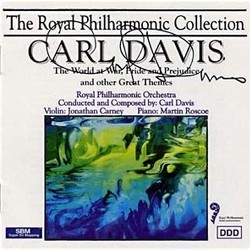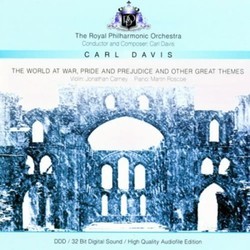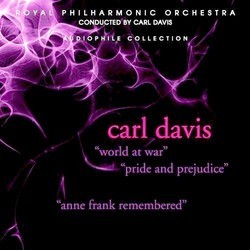The World at War, Pride and Prejudice and other Great Themes
Iscriviti ora!
Rimanete informati e richiedete l'accesso alle informazioni dei collezionisti!
Rimanete informati e richiedete l'accesso alle informazioni dei collezionisti!
| # | Traccia | Durata | |
|---|---|---|---|
| 1. | World at War | 5:25 | |
| 2. | Far Pavillions | 4:38 | |
| 3. | Pride and Prejudice | 3:49 | |
| 4. | The French Lieutenant's Woman Concert Suite | 11:02 | |
| 5. | Champions | 3:15 | |
| 6. | Anne Frank Remembered | 5:02 | |
| 7. | Variations on a Polish Beggar's Theme | 11:32 | |
| 8. | Hollywood | 3:50 | |
| 9. | Eagle of Destiny from 'Napoleon' | 3:43 | |
| 10. | Scandal | 4:05 | |
| 11. | Waltz and Love Scene from 'Flesh and the Devil' | 10:14 | |
| 66:34 |
'The World at War' is today regarded as the definitive series on the Second World War. It was made by Thames Television and produced by Jeremy Isaacs: 'In the title music I tried to compose something tragic and human rather than grandiose'. The middle section uses a march that I composed as a theme for the Germans. The series won many awards, including an Emmy.
The music for 'The Far Pavilions' goes to the other extreme. This was a lengthy dramatisation of M.M.Kaye's romantic novel, set in 19th Century India. The principal theme is based on the Indian Mode or raga system, which I had already integrated into a number of Indian related projects. I chose a specific mode and used its notes to create the rather sad and elegiac theme music.
'Pride and Prejudice', BBC's 1995 smash hit dramatisation of Jane Austen's novel, dealt with a time and a society in which, before the days of television and gramophone, people indulged in home entertainment on a colossal scale. They never seemed to stop playing, singing and dancing in their homes, and every well educated young lady was expected to learn to perform as a part of their social training. I decided therefore to use the sound of an instrument they would have played, the fortepiano, which was featured throughout the series. Since then I have created a concert piece, recorded here for the first time, which uses a modern piano, and which I think I like equally. The thought at the back of my mind was that this was a story about pursuit - the pursuit of a husband, and the pursuit of wealth.
'The French Lieutenant's Woman' was directed by Karel Reisz and starred Meryl Streep and Jeremy Irons. It was originally scored for an orchestra of strings and two harps. It is a very emotive, very intense romantic music whose aim was to express the inner thoughts and interior life of Sarah, the leading female character. The extended suite recorded here uses the main title, the meeting on the Cobb with her future lover, their assignation in the woods, the music for their one night of love, and their final meeting at Lake Windermere. The score won both a BAFTA and a Novello award.
'Champions' told the heroic and highly moving story of Bob Champion, the steeplechase jockey who successfully fought cancer, and his horse Aldaniti, who recovered from a broken leg, both going on to win the 1982 Grand National. The soundtrack recording of the theme has since been played every year at the start of the race, while Bob Champion and Aldaniti do a lap of honour. I was very interested to learn recently that whenever jockeys hear it they all burst into tears, because it brings home to them what is about to happen.
'Anne Frank Remembered' was directed by the highly gifted South African film-maker called John Blair and won an Academy Award in 1996 for the best documentary. John chose to explore Anne's life both before and after the celebrated composition of her diary. He found her old school mates and fellow prisoners who were actually with her during her final days, and filmed the woman who kept the family alive. I wanted the music to concentrate not on her tragedy but on the indomitability of her spirit.
'Variations on a Polish Beggar's Theme': In 1988, I was asked to compose a work for the Sasha Lasserson violin competition, and I decided to go back to material that I had previously written for the opening episode of a Thames TV documentary series called Destination America. I reworked the little Polish theme as a set of variations, initially for violin and piano and subsequently for violin and orchestra. As I composed the piece, I had in mind a little scenario of an impoverished Polish immigrant starting out in a very depressed way, gradually gaining confidence, crossing the ocean, reaching waht I jokingly called The Great Gate of New York, moving onto a love scene, and then a lively finale, which dies away until we're left with a final statement of the original theme.
'Hollywood' was inspired by Kevin Brownlow's book 'The Parade's Gone By' and was a thirteen part history of the silent film 'Hollywood', directed and produced by Kevin Brownlow and David Gill. These thirteen hours of film, which contained about twelve hours of music, engrossed us for a three-year period. It was broadcast in 1980, was a great success for Thames Television and was instantly sold to fifty countries. For the title music I decided to compose a sweeping, sentimental waltz, rather than the big, brassy fanfares that we tend to associate with the major film studios of the time.
'Eagle of Destiny from Napoleon': Able Gance's magnificent five-hour Napoleon was a 'lost' film until its authoritative restoration by Kevin Brownlow. By 1980, he had accumulated nearly five hours of material and in that form it was mounted at the London Film Festival, complete with a new score that was partly drawn from the works by composers of Napoleon's own period.
Occasionally, Gance created imagery that was simply to romantic for a period score, and it was in reponse to those particular moments that I composed my own music. The Eagle motif goes through the whole film as a symbol of Napoleon's determination.
'Scandal' was a fascinating film to do because I first came to England shortly before the Profumo scandal broke. When I came to score the film in 1989, I remembered the seediness and the sadness of it all, the story of two people who had their moment of glory but suffered a very sharp decline.
I've opted to end the album with an excerpt from the film that made Garbo a star, the 1925 'Flesh and the Devil'. She and her co-star, John Gilbert were said to have become lovers during the making of the film, and their love scenes were highly erotic. Garbo plays an evil temptress, which gave me the idea for the introductory snake-like motif on clarinets. Then follows the waltz scene, in which she dances with Gilbert before going out into the garden with him. There was a symbolic language of cigarettes in those days, and in the film he lights a cigarette and actually places it in her mouth. She is seen wonderfully in the light of the match-glow, and then suggestively blows the match out. I have tried to portray some of the 'smoking' passion in my music.
The music for 'The Far Pavilions' goes to the other extreme. This was a lengthy dramatisation of M.M.Kaye's romantic novel, set in 19th Century India. The principal theme is based on the Indian Mode or raga system, which I had already integrated into a number of Indian related projects. I chose a specific mode and used its notes to create the rather sad and elegiac theme music.
'Pride and Prejudice', BBC's 1995 smash hit dramatisation of Jane Austen's novel, dealt with a time and a society in which, before the days of television and gramophone, people indulged in home entertainment on a colossal scale. They never seemed to stop playing, singing and dancing in their homes, and every well educated young lady was expected to learn to perform as a part of their social training. I decided therefore to use the sound of an instrument they would have played, the fortepiano, which was featured throughout the series. Since then I have created a concert piece, recorded here for the first time, which uses a modern piano, and which I think I like equally. The thought at the back of my mind was that this was a story about pursuit - the pursuit of a husband, and the pursuit of wealth.
'The French Lieutenant's Woman' was directed by Karel Reisz and starred Meryl Streep and Jeremy Irons. It was originally scored for an orchestra of strings and two harps. It is a very emotive, very intense romantic music whose aim was to express the inner thoughts and interior life of Sarah, the leading female character. The extended suite recorded here uses the main title, the meeting on the Cobb with her future lover, their assignation in the woods, the music for their one night of love, and their final meeting at Lake Windermere. The score won both a BAFTA and a Novello award.
'Champions' told the heroic and highly moving story of Bob Champion, the steeplechase jockey who successfully fought cancer, and his horse Aldaniti, who recovered from a broken leg, both going on to win the 1982 Grand National. The soundtrack recording of the theme has since been played every year at the start of the race, while Bob Champion and Aldaniti do a lap of honour. I was very interested to learn recently that whenever jockeys hear it they all burst into tears, because it brings home to them what is about to happen.
'Anne Frank Remembered' was directed by the highly gifted South African film-maker called John Blair and won an Academy Award in 1996 for the best documentary. John chose to explore Anne's life both before and after the celebrated composition of her diary. He found her old school mates and fellow prisoners who were actually with her during her final days, and filmed the woman who kept the family alive. I wanted the music to concentrate not on her tragedy but on the indomitability of her spirit.
'Variations on a Polish Beggar's Theme': In 1988, I was asked to compose a work for the Sasha Lasserson violin competition, and I decided to go back to material that I had previously written for the opening episode of a Thames TV documentary series called Destination America. I reworked the little Polish theme as a set of variations, initially for violin and piano and subsequently for violin and orchestra. As I composed the piece, I had in mind a little scenario of an impoverished Polish immigrant starting out in a very depressed way, gradually gaining confidence, crossing the ocean, reaching waht I jokingly called The Great Gate of New York, moving onto a love scene, and then a lively finale, which dies away until we're left with a final statement of the original theme.
'Hollywood' was inspired by Kevin Brownlow's book 'The Parade's Gone By' and was a thirteen part history of the silent film 'Hollywood', directed and produced by Kevin Brownlow and David Gill. These thirteen hours of film, which contained about twelve hours of music, engrossed us for a three-year period. It was broadcast in 1980, was a great success for Thames Television and was instantly sold to fifty countries. For the title music I decided to compose a sweeping, sentimental waltz, rather than the big, brassy fanfares that we tend to associate with the major film studios of the time.
'Eagle of Destiny from Napoleon': Able Gance's magnificent five-hour Napoleon was a 'lost' film until its authoritative restoration by Kevin Brownlow. By 1980, he had accumulated nearly five hours of material and in that form it was mounted at the London Film Festival, complete with a new score that was partly drawn from the works by composers of Napoleon's own period.
Occasionally, Gance created imagery that was simply to romantic for a period score, and it was in reponse to those particular moments that I composed my own music. The Eagle motif goes through the whole film as a symbol of Napoleon's determination.
'Scandal' was a fascinating film to do because I first came to England shortly before the Profumo scandal broke. When I came to score the film in 1989, I remembered the seediness and the sadness of it all, the story of two people who had their moment of glory but suffered a very sharp decline.
I've opted to end the album with an excerpt from the film that made Garbo a star, the 1925 'Flesh and the Devil'. She and her co-star, John Gilbert were said to have become lovers during the making of the film, and their love scenes were highly erotic. Garbo plays an evil temptress, which gave me the idea for the introductory snake-like motif on clarinets. Then follows the waltz scene, in which she dances with Gilbert before going out into the garden with him. There was a symbolic language of cigarettes in those days, and in the film he lights a cigarette and actually places it in her mouth. She is seen wonderfully in the light of the match-glow, and then suggestively blows the match out. I have tried to portray some of the 'smoking' passion in my music.




